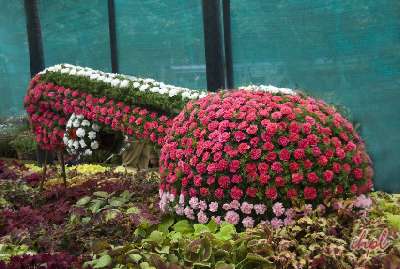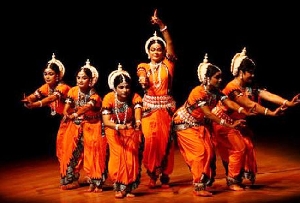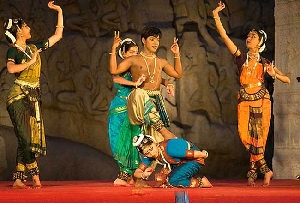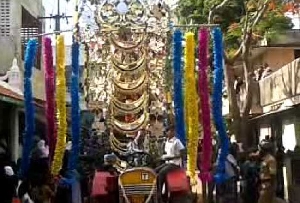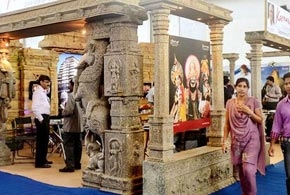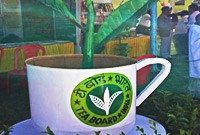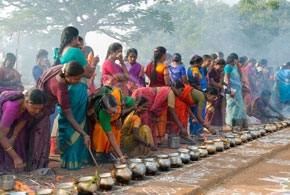One of the most popular Hindu harvest festivals in South India, Pongal is celebrated to thank Sun God and Lord Indra for helping in getting better yielding crops. It is also known as the harvest festival of India, which is celebrated from 14th January to 17th January every year. Pongal is celebrated in the month of January-February during the solar equinox after harvesting of crops like rice, sugarcane, and turmeric.
It is celebrated with great zeal and vigor in Tamil Nadu. Pongal is also referred to as Thai Pongal and corresponds to Makar Sankranti, which is a harvest festival and under many regional names celebrated throughout the country. This festival marks the end of the winter solstice and the auspicious beginning of Uttarayan – the sun’s journey towards northwards. The very first harvest of the rice is offered to the Sun God.
History of Pongal
The history of the festival traces back to the Sangam Age that is almost 2,000 years ago, from the era of 200 B.C to 300 A.D. According to the legends, the unmarried girls pray for the prosperity of the country, and for this they observe penance during the Tamil month of Margazhi (December-January). They abstained themselves from milk, milk products, oiling their hairs, and a rigid way of talking. They worship the idol of Goddess Katyayani that would be carved out of wet sand.
The penance was to bring abundant rain to flourish paddy and they ended the penance on the first day of the Thai (January-February). As per Hindu mythology, it is believed that gods wake up after being asleep for 6 months. This time of the year is revered as the Uttarayana Punyakalam. It is also believed that those who depart from life in Uttarayan are bound to attain salvation.
Check out Tamil Nadu tour packages, Rameswaram tour packages, Coimbatore tour packages
Legends of Pongal
There are two legendary stories associated with the Pongal festival. The stories are related to Lord Shiva and Lord Indra. As per the first legendary story, Lord Shiva asks his bull Basava or Nandi to go to earth and asks humans to oil massage as well as take everyday while eat once a month. However, Basava mistakenly told humans to eat daily while oil massage and bath once a month. To this, Lord Shiva gets angry and banishes Basava. He also cursed him to live on earth forever and plough the field to produce more mood. Hence, there is an association of this legend to honour the cattles on the third day of the Pongdal.
Another legend associated with this festival is related to Lord Indra. During his childhood, Lord Krishna asked all the cowherds to worship Govardhan Parvat instead of Lord Indra. This act of Lord Krishna infuriated Lord Indra due to which he sent his clouds to bring thunderstorms for three-consecutive days. To save the people from the heavy rain and flood, Lord Krishna lifts the Govardhan Parvat on his little finger. After watching this, Lord Indra realises his mistake and begs for forgiveness. To honour the Lord Indra, Lord Krishna devotes the first day celebration of Pongal to him.
Check out Ooty tour packages, Kodaikanal tour packages, Coonoor tour packages, Trichy tour packages
Traditional Pongal Dishes
The most significant practice of the festival is the preparation of the ‘Pongal’ dish, which is prepared from the freshly harvested rice. This dish is cooked by boiling the rice in milk and raw cane sugar (jaggery). Sometimes, more ingredients add to the sweet dish such as cardamom, raisins, cashews, and green gram. Coconut and ghee (clarified butter from cow milk) are also added to the sweet dish to enhance flavor. Some people also prepare salty and savory (Ven Pongal) along with the sweet dish. The women cook the sweet dish in the sunlight, usually in the porch or courtyard. The dish prepares in a clay pot, which is decorated with garlands, leaves, and artwork (kolam). The portion of sweet Pongal dish is also distributed as prasadam in the temples.
Celebrations of Pongal Festival
This festival is celebrated with great zeal and vigor throughout the globe by Tamils. It is a four-day-long celebration with each day marked with different festivities. Pongal cherishes the abundant harvesting of crops.
Bhogi Pongal (14th January) – The festival begins on the day called Bhogi Pongal. This is the first day of the festival and is marked as the last day of the Tamil month Marghazi. On this day, people discard old belongings and celebrate new possessions. They assemble and light the bonfire in which they burn the discards. People decorated their houses to give a festive look and they also painted the horns of the oxen and buffaloes. On this day, the prayers are offered to the Lord Indra with thanks and hopes of plentiful rains in the year ahead.
Surya Pongal (15th January) – The second day of the festival is called Surya Pongal, which is also referred to as Suryan Pongal or Perum Pongal. It is the first day of the Tamil calendar Thai and coincides with the Makar Sankranti. This day is dedicated to Lord Sun or Surya Dev. The Pongal dish is prepared in the traditional earthen pot and celebrates the day with the family as well as relatives. Women sing traditional songs while the dish is cooking and men offer prayers to the Sun God traditionally.
Mattu Pongal (16th January) – the third day of the festival is celebrated as Mattu Pongal, which is dedicated to cows, bullocks, and cattle. Tamil Hindu considered cattle as the source of wealth for providing dairy products, transportation, fertilization, and agricultural aid. They decorate their cattle with garlands, paint their horns, and feed them a mixture of Ven Pongal, honey, jaggery, and fruits. Jallikattu, cattle race, and cultural festivities are the highlights of the third-day celebration of Pongal.
Kanum Pongal (17th January) – This day marks the end of the Pongal festivities of the year. On this day, many families hold reunions and organize social events to strengthen social bonds. Villagers cut and consume fresh sugarcane during social gatherings. Kanu Pidi is a tradition observed on Mattu Pongal by women and girls. They feed the leftover Pongal dish and food from Surya Pongal to birds and crows. They also pray for the well-being of their brothers and they give gifts to their married sisters as an affirmation of their bond and love.
Browse through our Ooty tour packages from Hyderabad
Pongal Celebration in Kerala
Kerala shares the cultural similarity with Tamils through the Chera dynasty. The rituals including the preparation of sweet dish ‘Pongal’, reverence of cattle, and social visits are the same as in Tamil Nadu. This festival marks the largest pilgrimage and annual gathering of women in Attukal Bhagavathy Temple near Thiruvananthapuram. The Pongal Festival falls according to the Malayalam calendar in Makaram-Kumbham (February-March). Attukal Pongala is one of the largest gatherings of women in the world. The festival celebration includes dance and music performances by boys and girls as well as the major procession featuring the temple goddess.






